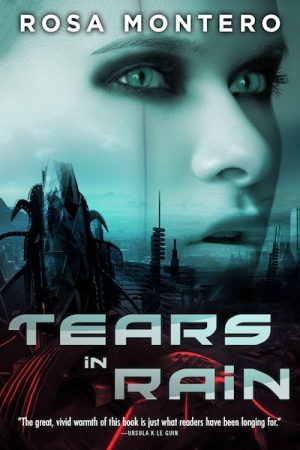
Author Rosa Montero is a Spanish journalist who has written more than 26 books. Most of her works are not available in English, and Tears in Rain will be the first introduction for many readers. Montero talked to Ars from her home in Spain about the novel and its parallels to the real world as our biotechnologies and artificial intelligence efforts continue to progress.
"Phillip K. Dick’s Do Androids Dream of Electric Sheep and Ridley Scott’s Blade Runner film form part of the substrate of my novel," Montero said. "I read the book twenty years ago but the story in Tears of Rain is all its own. I explore the issues regarding replicants and artificial intelligence, both of which are luminous concepts.”
Indeed, it’s misguided to think about Tears in Rain as belonging to the previous book and film. It’s probably more accurate to say that Rosa Montero’s novel places a mirror in front of the ideas of Phillip K. Dick and Ridley Scott—it develops new ideas and questions about identity and memory, and it further explores the ways in which the reps are discriminated against. Montero accomplishes this by creating a charismatic heroine in Bruna, who sets out to investigate the film-noir environment of her futuristic society. Unlike the replicants and androids from many other works of fiction, Bruna is full of drive and passion. She’s a woman of action. Bruna also provides a much-needed female perspective to the book's ideas about what it would mean to be a cloned human with memories that aren’t real.
A technological war of the future

One of the most engrossing elements of Tears in Rain is the detailed history of the world. Every few chapters, Montero treats the reader to passages of historical information that provide satisfying detail about how a world full of replicant servants came to be. Midway through the 21st century, the exploration of Mars and Saturn led to the development of androids who could be forced to mine colonies. Replicants used in this way became a success and were eventually repurposed for jobs on Earth, such as deep-sea-fish farming. Over time, some of the reps rose against their owners and started what became the Rep War. Montero fills the book with details of the treaties, laws, and wars that have shaped the world. We also learn many of the ways in which the biology of the replicants has been manipulated. At the center of these events are the totalitarian corporations and governments that put a stranglehold on citizens.
"My novel denounces totalitarianism," Montero told Ars. "Corruption is inherent to human life, but it doesn’t mean it has to be accepted by people."
The malleability of memory fuels the ways in which corrupt governments oppress their citizens. Bruna’s own memories may not be what she thinks they are. "Memory is truly an imaginary construct when you think about it," Montero said. "Even the way you and I remember earlier events, like birthdays and love affairs—they change over a lifetime. We are editing them all the time. [In the book] authoritarian and totalitarian regimes control when they manipulate this archive of information, when they take hold of the narrative... as they do with the reps’ memories."
Despite creating a bleak outlook on the misuse of information and technology, Montero says she appreciates the ways in which technology connects people around the globe. "Social media and technology are part of the Internet, and the Internet is a wonderful tool. At the same time, the problems we see with aggressive discourse, bullying, and mob mentality are awful. But the Internet is in its infancy, and things will change. And just like any other tool or technology, the Internet’s potential for good or bad depends on how it’s utilized."
Montero, who has spent a lifetime as a journalist and author, has an insatiable energy and curiosity for life. In some ways, she sees her android heroine as a manifestation of herself. "Bruna just appeared to me one day. I had no control over who she was. She’s a favorite of mine, and she has such a fierce [desire] to live. I feel so close to her. Sure, she may drink more than I do, but in many ways, we are similar."
Montero says she will be writing a sequel to Tears in Rain soon.
reader comments
100